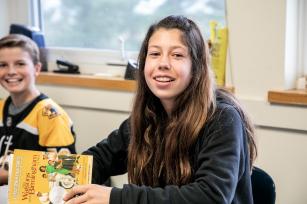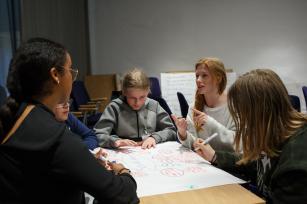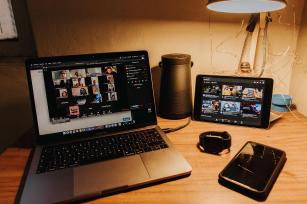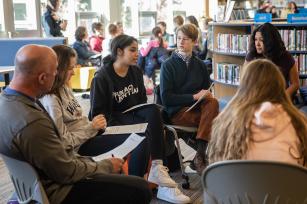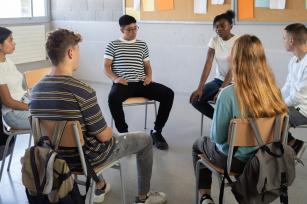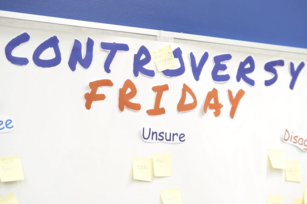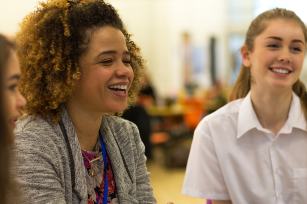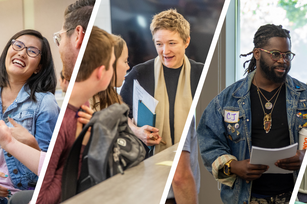
Breadcrumb
- Essential Partners
- Our Impact
- Impact Stories
- Teachers, Students Use Dialogue to Evaluate Classroom Engagement Strategies
Teachers, Students Use Dialogue to Evaluate Classroom Engagement Strategies
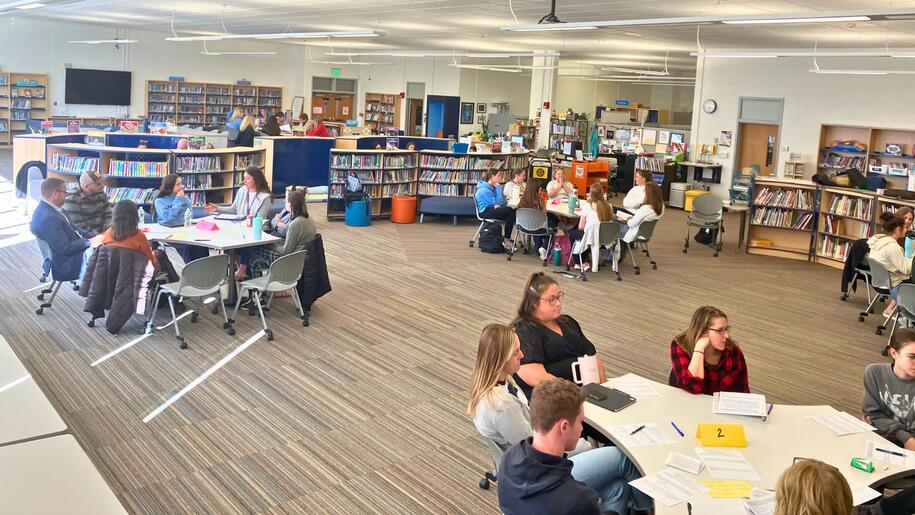
“Reflective Structured Dialogue allows people to be their authentic selves and empowers them to hear different perspectives.”
Lynne Cote, High School Librarian
Newburyport, MA
A district on the North Shore of Massachusetts with 450 educators and more than 2,000 students, Newburyport Public Schools recently led an innovative, year-long professional development course based on the principles of conscious classroom management. The course boasted a hands-on, experimental syllabus that asked, What are the elements that create effective, inclusive, engaging classroom cultures?
To explore that question and evaluate the classroom tools that the course revolved around, 45 teachers and 20 students participated in a Reflective Structured Dialogue about the lived experiences of educators and students alike. They each had an opportunity to share their perspectives on what was working, on drawbacks or misses, and on personal challenges and successes, responding to questions such as:
- Can you share an experience you’ve had when you were fully present and excited to participate in a class? Maybe a specific activity, a certain unit, a long-term project, or even a semester-long class.
- Can you share an experience you’ve had in a classroom where you felt that things didn’t go as well for you? Perhaps this was an activity, a unit, or even a class that you found yourself dreading or spent a lot of time worrying about.
- Based on everything you’ve shared and what you’ve heard from others in this conversation, what responsibilities do you think students and teachers share to ensure an engaging and respectful learning culture?
“Reflective Structured Dialogue allows people to be their authentic selves and empowers them to hear different perspectives,” said Newburyport High School librarian Lynne Cote, a longtime EP collaborator and an organizer of the dialogue. “It’s unusual, broadly speaking, for students to feel like their views matter to the school system, that teachers will listen to them. It’s unusual for teachers to have the chance to be more open and human with students about their hopes and challenges in the classroom.”
The students were initially hesitant, said Cote. “I told them: these teachers have been taking a class about how to engage all of you, and now we need feedback. We need to know what lands and what doesn't work. You all know when teachers are really trying and it's just not hitting—they need to know that too.”
For many students, it was their first authentic conversation with a teacher. The prospect of giving them direct feedback was daunting. “But after they participated in the dialogue,” Cote said, “they were like, Can we do that again? That was amazing. Oh my gosh, this is so good.”
Preparation and a robust planning team were crucial to the dialogue’s success, said Newburyport middle school teacher and EP practitioner Eric Schildge. “There are too many moving parts. You need the support of a team to make this work, so some people can focus on preparation and design while someone else tackles logistics.”
District leaders in particular played a key role as catalysts—first by encouraging the Conscious Classroom program, and then by having the vision to see how dialogue might effectively draw out the honest, complex perspectives of students and educators.
This dialogue—which will shape classroom culture across the district—is the result of a longtime collaboration between the Newburyport Public School District and Essential Partners, an effort that has made the skills and tools of dialogue part of the lifeblood of their school system. Educators, school leaders, and students continue to adapt and deploy Reflective Structured Dialogue in innovative and exciting ways. It’s helping them build a healthier, more connected, more effective educational system.
Related Impact Stories
Testimonials

High School StudentThe most significant thing I've learned in this program is that having an open mindset when listening to others' opinions different from yours to understand their perspective instead of finding the flaws to oppose their opinion to try and change their mind.
Raleigh, NC

Linda Gryczan, MediatorInstead of demonizing and dehumanizing the other, we built a deeper connection. The fact that we disagree matters much less. It matters much more that we are neighbors in this community.
Montana Mediation Association

Jordan Cuffee ’21The dialogue training allowed me to push myself to speak up first. In an informal conversation, I’m not usually the first person to voice my opinion; I usually end up listening, rather than taking a stance on sharing my opinion. But the dialogue training empowered us to decide if we want to say something now or listen. It really made me feel part of the conversation, rather than being on the outside, observing.
Cary Academy, NC

Sophia Hopper ’24Dialogue changed how I think about the way my school runs.… now I know the people running this institution. I know their values. I know their story. There's a whole new level of trust in the institution itself.
Ravenscroft School, North Carolina

Belle AbayaTogether, we married our ideas to create a dialogue model that took into consideration our young people’s particular needs, and our culture.
The Conflict Resolution Group Foundation, Philippines

Program ParticipantI did not anticipate having as many concrete takeaways as I do. I feel there is an immense practical application.

High School StudentSimply changing the wording of a question can invite a completely different personality and emotion around a question. You can learn so much more and have a better understanding of someone's perspective by changing your question.
Raleigh, NC

Secondary School TeacherEP's approach has given me some tools to deal with what comes up in my classroom. I teach classes about charged topics. As I’m thinking about and exploring ways to broach these conversations with students, I use this.
New Jersey

Allyson Bachta, K-12 Educator and AdministratorEP's approach is flexible enough to support educators working across diverse contexts and parallels work that they are already doing to support students' social-emotional development, create trauma-sensitive classrooms and schools, and differentiate learning experiences to meet the needs of all learners.
Massachusetts

High School StudentThe thing that surprised me, was the amount of respect given to each person while speaking in the meeting. I thought that discussing politics would eventually cause problems, but it did not.
Raleigh, NC

Misty Stoll, School Board TrusteeI ran for my local school board in 2018 and was elected. I use the skills in our meetings, whether I’m chairing the meeting or not. This makes the meetings much more productive. We don’t go over the same topics over and over again.
Wyoming

High School StudentIt honestly surprised me that we were doing [dialogues about the 2020 election] in the first place. I have gone to this school since Kindergarten, and I have seen the recurring pattern of the faculty and staff looking to keep politics out of school discussion, which is completely understandable. Growing up this way has built a sort of stigma around politics that I feel like affected my experience in these activities. This also prompted me to learn more about how I feel about these topics.
North Carolina

Bob Bordone, Expert and AuthorEssential Partners does the best work in the field of dialogue and communication.
Harvard Negotiation & Mediation Clinical Program, Co-Founder

Cat Anderson, EducatorIt's incredible to really see the evolution and the change of these students, once they're given the tools—and Essential Partners has really helped me do that.
Boulevard Academy, Oklahoma

Teresa Grettano, Associate Professor and Director of the First-Year Writing programFacilitated dialogue creates a classroom atmosphere in which exploring uncomfortable issues and asking difficult questions is an expected part of the process, and it allows students space to engage each other without fear of the vitriol common in our public discourse.
University of Scranton (PA)

Meirav Solomon ’20Dialogue not only teaches you how to interact and understand more deeply those around you, it also teaches you more about the world around you and yourself. I think dialogue is super important to my growth as a student, a global citizen and a human being. I have learned to listen, I have learned to speak out, I have learned how to access my stretch zone (where I feel uncomfortable speaking but not turned off) and I have learned where my limits are.
Cary Academy, NC

Becca Humphries ’21The dialogue setting created an environment where people weren’t afraid to open up and share those things that they might not always share out loud. It made us feel closer and provided a stronger sense of trust. It allowed me to be vulnerable to people outside of my community and to be open to sharing.
Cary Academy, NC

High School StudentI learned that through productive dialogue, you can make relationships and friendships with people through talking about your differences and similarities.
Newburyport, MA

Cricket Fuller, The Christian Science MonitorThis wasn’t a policy debate [about guns]. Instead, two people whose backgrounds and views diverged in almost every way possible shared a moment of honesty that struck at the heart of the matter.
Boston, Massachusetts

Secondary School TeacherEP's approach allows all the students in the room to speak and be heard, to think about different perspectives on the issue without getting into arguments or fights.
San Diego, CA

Parent, Cary AcademyEssential Partners's dialogue initiative is, literally, the best forum I have attended during my time at Cary Academy. The openness and sharing in our group led to genuine connections. I’m not sure words can express how meaningful this event was to me. Truly priceless.
Cary, North Carolina

Kim Davidson, OmbudsI’ve gained not only confidence but tools. The Essential Partners training was worth every penny.
Oberlin College, Ohio

High School StudentI can't even begin to explain the gratitude and fulfillment I felt from participating in this Essential Partners COVID-19 dialogue. It helped me better understand myself and what I hope to accomplish throughout this period of uncertainty.

Nicki Glasser, Policy CoordinatorWhat surprised me was how much you could transform a relationship during a three-hour conversation.
Transformation Center, Massachusetts

Andrew Wulf, PrincipalThe community dialogue was instrumental in helping us create a new policy around class rank. Though a controversial topic in the community, the dialogue EP helped us run ensured all voices were heard and valued. Regardless of how people felt with the final result, one parent summed it up best for us, ‘sometimes the process is more important than the outcome’.
Newburyport High School

Becca Humphries ’21The dialogue setting created an environment where people weren’t afraid to open up and share those things that they might not always share out loud. It made us feel closer and provided a stronger sense of trust. It allowed me to be vulnerable to people outside of my community and to be open to sharing.
Cary Academy, NC

Kimberly Shaw, EducatorStudent facilitators flip the script. When students lead, you can see a change occur, a shift as they understand the difference between being a participant and being a facilitator, as they work to hear and address the needs of their classmates and community.
North Carolina

Clay Thornton ’21Having an environment that gives you that space to listen to others talk about their experiences and understand how those experiences have led them to the opinions that they have—it is truly eye-opening.
Cary Academy, NC

Program ParticipantThis is the best adult learning experience I have had in the past five years. I wanted to learn new skills—I did!

Secondary School TeacherI’m a world history teacher… now I feel I’m more empowered about how to make connections across differences. I have a better skill set to facilitate connections.
New York City

Vibhav Nandagiri ’21When a debate occurs, you never feel like you get to hear a person’s full point of view. But, through dialogue, you get to learn someone else’s perspective without any competitive need to win an argument. It leads to mutual understanding; listening to each other helps us chip away at our differences.
Cary Academy, NC

10th Grade StudentEP's questions of understanding exercise felt like the debate that we wish the presidential candidates would have—instead of having to listen to two old guys yelling over each other.
Ravenscroft School, NC

Meirav Solomon ’21Vulnerability is the key. A lot of perspective-taking is based in vulnerability. It’s the key ingredient in a good structured dialogue. It’s crucial to the ‘meet me in the middle’ experience that dialogue is all about.
Cary Academy, NC

Megan DeFranzaHere safe space was created for pastors and church leaders to wrestle with topics like evolution which are all too often “off limits” or believed to be antagonistic to the faith.
Gordon College, Massachusetts

Lucinda Garcia, Researcher, Educator & AdvocateThe Dialogic Pedagogy Fellowship at Tufts University, in collaboration with Essential Partners, gave me transformative social-emotional learning and facilitation skills to support meaningful dialogue in the classroom. I’m excited to apply what I’ve learned to design questions that invite personal narratives, value-based discussion, and comfort with complexity—all in service of building a classroom climate where productive dialogue and engaged learning can flourish.

Program ParticipantI felt an amazing sense of accomplishment when the Essential Partners training ended; that I'd done something important for my community and something important for me.
Massachusetts
